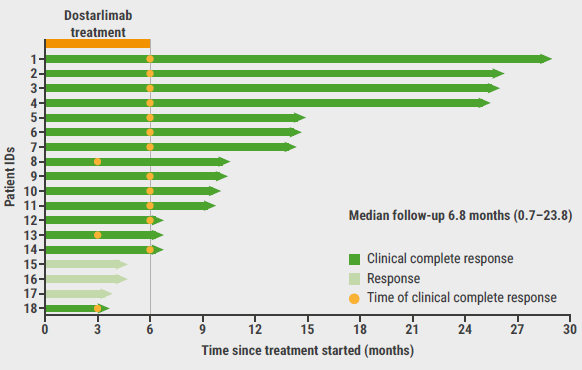https://doi.org/10.55788/82538bd1
Trabectedin in combination with pegylated liposomal doxorubicin (PLD) is an approved treatment for patients with platinum-sensitive recurrent ovarian cancer [1]. Dr Domenica Lorusso (San Raffaele Scientific Institute, Italy) presented the phase 3 MIT023 trial results which assessed the efficacy and safety of trabectedin in patients with BRCA-mutated or BRCAness phenotype recurrent epithelial ovarian cancer [2]. In total, 244 patients were randomised 1:1 to trabectedin or investigator’s choice chemotherapy. The primary endpoint was overall survival (OS).
After a median follow-up of 18.8 months, trabectedin failed to demonstrate an OS benefit over chemotherapy (15.8 vs 17.9 months; HR 1.15; P=0.304). Similarly, progression-free survival rates (4.9 vs 4.4 months) and overall response rates (17.1% vs 21.4%) did not show a substantial difference between the 2 treatment arms. In addition, no subgroup appeared to benefit more from trabectedin than from chemotherapy.
Serious adverse events were observed in 24.8% of the patients on trabectedin and in 5.1% of the patients on chemotherapy. The rate of treatment discontinuations was higher in the experimental arm (15.7% vs 5.9%). Febrile neutropenia (4.1%), neutropenia (34.7%), hepatic toxicity (14.9%), fatigue (15.7%), and nausea (7,4%) were the most distinctive grade ≥3 adverse events in the experimental arm.
Dr Lorusso commented that trabectedin did show a retained clinical activity comparable with chemotherapy, despite the fact that this study analysed patients that were heavily pre-treated. Therefore, translational studies are ongoing to detect which patients are more likely to respond to trabectedin.
- Poveda A, et al. Ann Oncol. 2011;22(1):39‒48.
- Scambia G, et al. Randomized phase III trial on trabectedin (ET-743) single agent versus clinician’s choice chemotherapy in recurrent ovarian, primary peritoneal, or fallopian tube cancers of BRCA-mutated or BRCAness phenotype patients (MITO23). LBA5504, ASCO 2022 Annual Meeting, 3–7 June, Chicago, IL, USA.
Copyright ©2022 Medicom Medical Publishers
Posted on
Previous Article
« Encouraging results of relacorilant in ovarian cancer Next Article
Primary results of rucaparib in ovarian cancer »
« Encouraging results of relacorilant in ovarian cancer Next Article
Primary results of rucaparib in ovarian cancer »
Table of Contents: ASCO 2022
Featured articles
Breast Cancer
Sacituzumab govitecan meets primary endpoint
Shaky OS results of palbociclib in ER-positive/HER2-negative breast cancer
Practice-changing results of T-DXd in HER2-low breast cancer
SET2,3 to inform on chemotherapy decisions in ER-positive breast cancer
Metastasis-directed therapy fails in oligometastatic breast cancer
Analysis by residual cancer burden further clarifies effect of pembrolizumab
Contribution of metastatic therapies on mortality reduction in breast cancer
Radiotherapy may be omitted in breast cancer patients
Promising data for ribociclib after progression on ET plus CDK4/6 inhibitors in HR-positive/HER2-negative metastatic breast cancer
7-gene biosignature: Benefits of endocrine therapy and radiotherapy in breast cancer risk groups
Lung Cancer
Additional tiragolumab does not help patients with untreated small cell lung cancer
Success for serplulimab plus chemotherapy in small cell lung cancer
Adagrasib safe and clinically active in non-small cell lung cancer
Long-term benefits of combined immunotherapy over chemotherapy in non-small cell lung cancer
Effect of KRAS mutations and PD-L1 expression on therapy response in non-small cell lung cancer
Melanoma
First results on distant metastasis-free survival in stage II melanoma
Higher response rates for concurrent triple therapy versus sequential therapy in melanoma
Genitourinary Cancers
Exploratory treatment options fail in ccRCC
Adjuvant everolimus did not benefit high-risk renal cell carcinoma
Cabozantinib fails as first-line maintenance therapy in urothelial cancer
177Lu-PSMA-617 is a valid treatment option for PSMA-positive mCRPC
Enzalutamide performs well in metastatic hormone-sensitive prostate cancer
Haematologic Malignancies
Autologous stem cell transplantation plus RVd improves PFS in multiple myeloma
Novel first-line treatment option for mantle cell lymphoma
Promising results for novel CAR-T therapy in relapsed/refractory multiple myeloma
Gastrointestinal Cancers
Panitumumab beats bevacizumab in RAS wildtype left-sided metastatic colorectal cancer
Spectacular results for dostarlimab in mismatch repair deficient rectal cancer
Triplet chemotherapy beats doublet chemotherapy in colorectal cancer liver metastases
To resect or not to resect primary tumours in stage IV colon cancer?
Novel treatment option for KRAS wildtype pancreatic cancer
Gynaecological Cancers
Primary results of rucaparib in ovarian cancer
Trabectedin not superior to chemotherapy in recurrent epithelial ovarian cancer
Encouraging results of relacorilant in ovarian cancer
Miscellaneous Topics
Bacterial decolonisation effective against radiation dermatitis
New standard-of-care for cisplatin-ineligible locally advanced head and neck squamous cell carcinoma
Ifosfamide is likely to be the go-to therapy in recurrent Ewing sarcoma
Dabrafenib plus trametinib candidates for standard-of-care in BRAF V600-mutated paediatric low-grade glioma
Related Articles
August 5, 2022
Radiotherapy may be omitted in breast cancer patients

© 2024 Medicom Medical Publishers. All rights reserved. Terms and Conditions | Privacy Policy
HEAD OFFICE
Laarderhoogtweg 25
1101 EB Amsterdam
The Netherlands
T: +31 85 4012 560
E: publishers@medicom-publishers.com

